Raising the Flag: Crossdressers and LGBTQ Participation in the 2024 Olympics
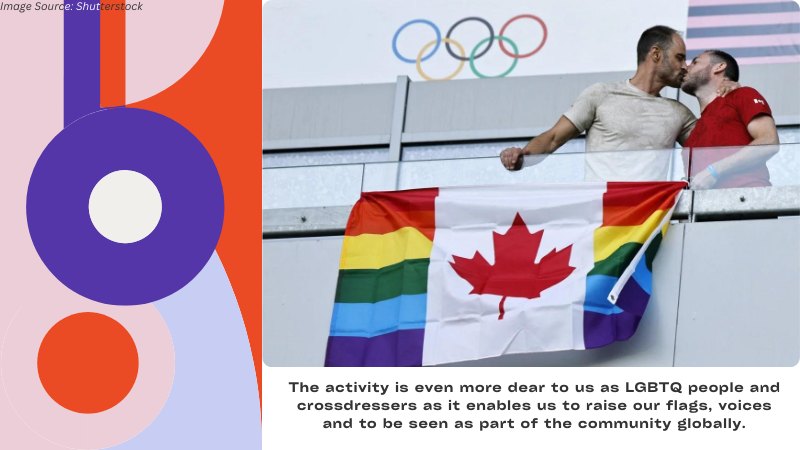
The Olympics represents a culture’s and people’s ability to come together and appreciate the strength and competitive spirit of athletes across the globe. The activity is even more dear to us as LGBTQ people and crossdressers as it enables us to raise our flags and voices and to be seen as part of the community globally. Also, the event shows our athletes’ success and visibility. It shows their progress in the fight for Equality and inclusion. This article will discuss flying the flag for crossdressers and LGBTQ people at the 2024 Olympics. It will also analyze the significance of the 2024 Olympics for the LGBTQ community, accomplishments, challenges, and possible future ahead.
Significance of the 2024 Olympics for the LGBTQ community
In 2024, we have experienced a great change in the Olympics as the LGBTQ community.
This great change has led to various significance such as:
● Worldwide visibility
The Olympics is the most known sport globally that occurs after four years.
The 2024 Olympics will let us show our unique talents to millions. We hoped to change their negative views of us.
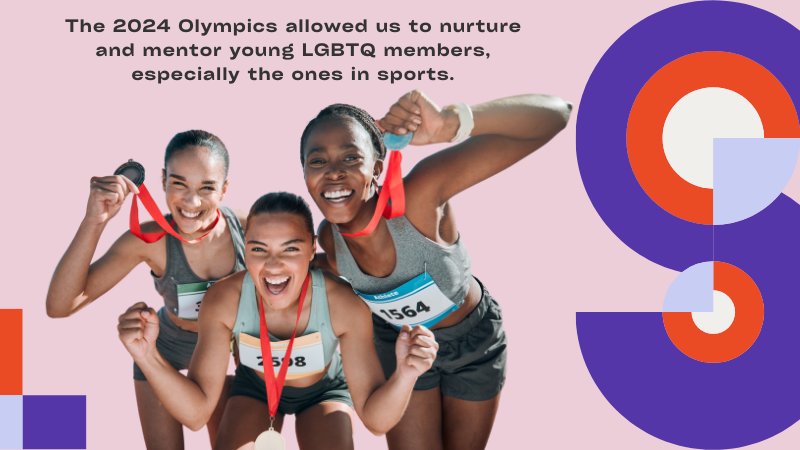
● Role models and mentors for generations
The 2024 Olympics allowed us to nurture and mentor young LGBTQ members, especially the ones in sports.
The event also enables us to help the youths struggling with their identity crises and make them feel empowered by us to continue with their talents in sports as LGBTQ members.
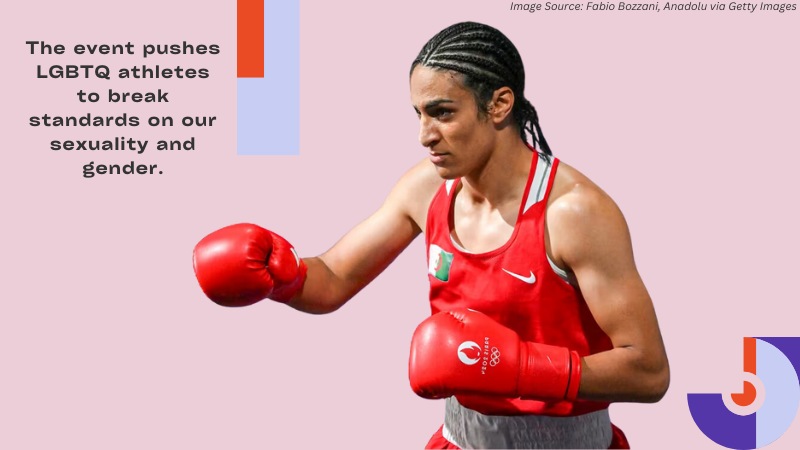
● Breaking stereotype
Being part of the Olympics 2024 enables us to break some worldwide misconceptions about the LGBTQ community.
The event pushes LGBTQ athletes to break standards on our sexuality and gender.
We show the world our desires and talents.
● Creating Inclusive Spaces
I am glad that through the 2024 Olympics, there has been so much inclusivity and support of our kind from other communities across the globe.
Our athletes feel included when choosing who they want to identify as in society.
● Advancing Equality
The 2024 Olympics aims to create inclusivity and equity. It has also made all participants equal.
We can now proudly say there is progress in ending discrimination against LGBTQ members in sports.
The importance of visibility and representation in sports
Visibility and representation in sports are essential for us as the LGBTQ community. This includes:
● Normalizing LGBTQ Identities
LGBTQ athletes pave the way for others. They allow us to be seen in public.
This helps us with such traits to embrace our full potential.
The visibility of sports as a social construct thus plays a key role in understanding our experience while at the same time disassembling existing LGBTQ phobias.
Also, those of us in sports offer genuine reference to young persons who may be struggling with their sexual identity.
Being normalized can help us maintain the internal conflict, besides putting into practice our desire to live our lives.
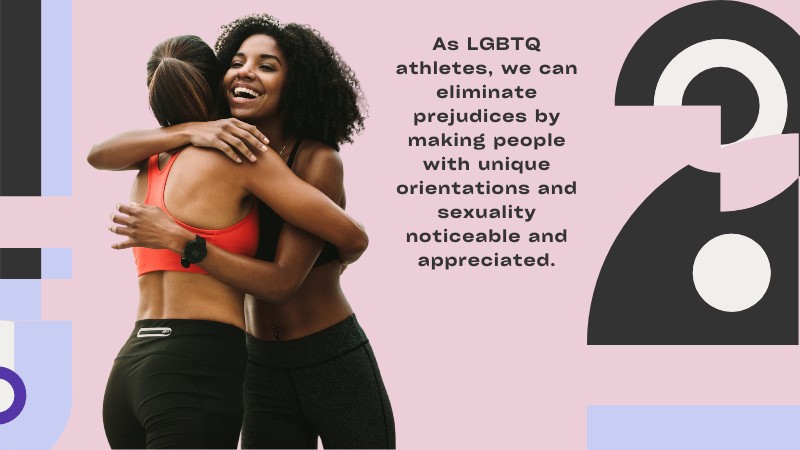
● Reducing Stigma
We should know that representation minimizes the prejudice associated with being of the LGBTQ community, making workplaces more accepting.
People always associate certain negative attributes with us because they have little or no interaction.
As LGBTQ athletes, we can eliminate prejudices by making people with unique orientations and sexuality noticeable and appreciated.
Mainstream sports that have athletes in the LGBTQ can equally create awareness.
Remember, embracing sporting events and gender identities increases the chances of the public’s acceptance.
Visibility for the LGBTQ community decreases prejudice; thus, we will be safer if seen in the sports field.
● Eliminates Discrimination
For years, we have struggled with discrimination in the sporting activities of the LGBTQ community.
The visibility of LGBTQ athletes, in essence, challenges sports, as well as other discriminative organizations.
Coming out for the most part, our athletes fought against discrimination and fought for equal rights.
They also work to campaign for its rights, leading to the formation of anti-discrimination rules in sports organizations and support networks for LGBTQ athletes.
● Mental Health Benefits
The Olympics’ representation gives us a sense of belonging and value.
The visibility and representation in society help us mentally as we do not get stressed or isolated due to our unique gender identity.
It also helps us athletes to focus on winning and excelling.
Inclusion and recognition are comforting and less harmful to our self-image.
Visibility also helps society break the circle of experiencing homophobia and transphobia, and in turn, as LGBTQ athletes, we will improve our self-esteem.
● Inspiring Participation
Visibility motivates our inclusion and diversity within a state or nation by increasing our representation in all sporting activities.
The advocacy of LGBTQ athletes gives us the morale to practice what we love most in sports without feeling the world will not recognize us.
This inspiration can encourage sports from the lower levels, school, and college up to professional leagues.
Also, our players are in a position to influence sports organizations to implement more friendly processes so that other LGBTQ members can easily participate and remain active in sporting activities.
Inclusion in sports brings out the diversity and beauty of sports, as everyone has a right to be accepted and encouraged to practice sports.
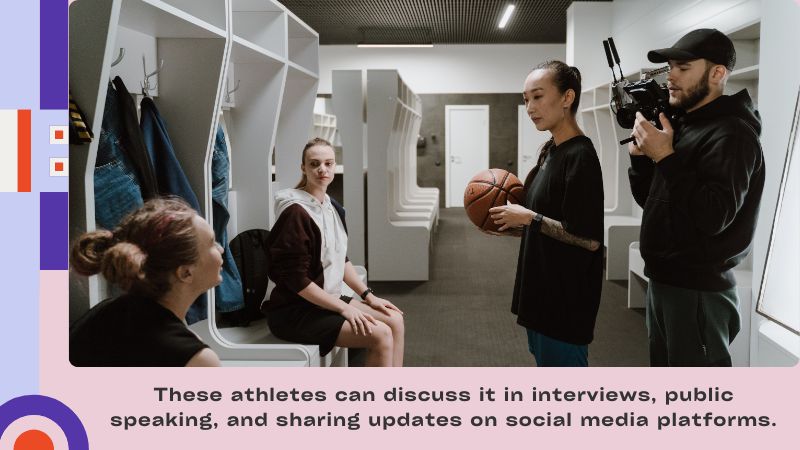
● Educational Opportunities
LGBTQ in sports issues and achievements may also be known by the fans and the public with the presence of visible LGBTQ athletes.
LGBTQ athletes may teach fans and the public something.
These athletes can discuss it in interviews, public speaking, and sharing updates on social media platforms.
This can help people understand issues in LGBTQ sports, like discrimination and harassment.
LGBTQ Milestones in Sports
Despite facing various challenges and hardships, we have managed to go far in sports as an LGBTQ community.
Here are the LGBTQ milestones in sports:
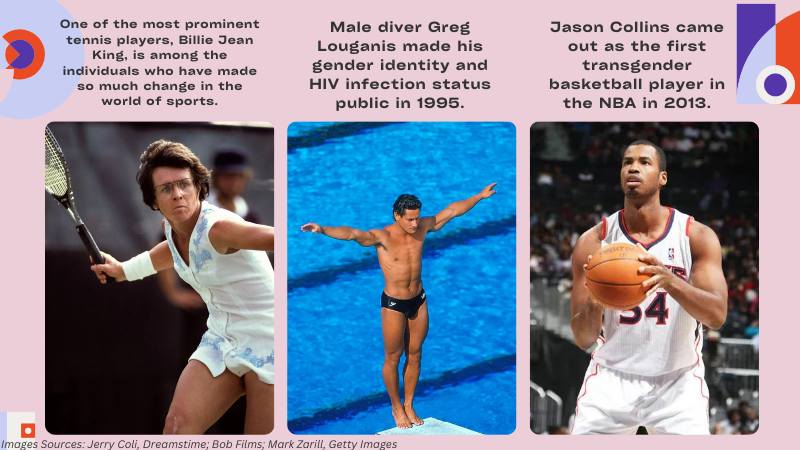
● Billie Jean King (1971)
One of the most prominent tennis players, Billie Jean King, is among the individuals who have made so much change in the world of sports.
She also fought for the Equality of women and gay rights in her profession.
King, in 1971, was a game changer in the destiny of the LGBTQ.
She dared to come out as a gay lady, which in the past when transgenderism was not accepted in the society.
Her bravery paved the way for future athletes to embrace themselves without feeling awkward.
King has greatly contributed to sports equality.
She began this work through the WTA and Women’s Sports Foundation.
● Greg Louganis (1995)
Male diver Greg Louganis made his gender identity and HIV infection status public in 1995. Louganis is honest about his sexuality and shares information on AIDS and HIV.
His HIV/AIDS status announcement was perhaps even more impactful because of general fear and misconception.
Louganis is the Olympic champion in springboard diving.
He won four golds, making him one of the greatest divers ever.
The revelation of his homosexuality and sickly state brought the HIV/AIDS epidemic into the real human world through advocacy for free conversation.
● Jason Collins (2013)
Jason Collins came out as the first transgender basketball player in the NBA in 2013.
Collins’ declaration boosted LGBTQ acceptance in pro sports by inspiring diversity.
Superstars, fans, and the media backed Collins when he came out of the closet.
His courage in the way he lived liberated many in sports concerning discrimination and precipitated the fight against homophobia.
Collins contributed to creating gay sports teams other than basketball.
He motivates athletes to embrace themselves and fight for the rights of sports.
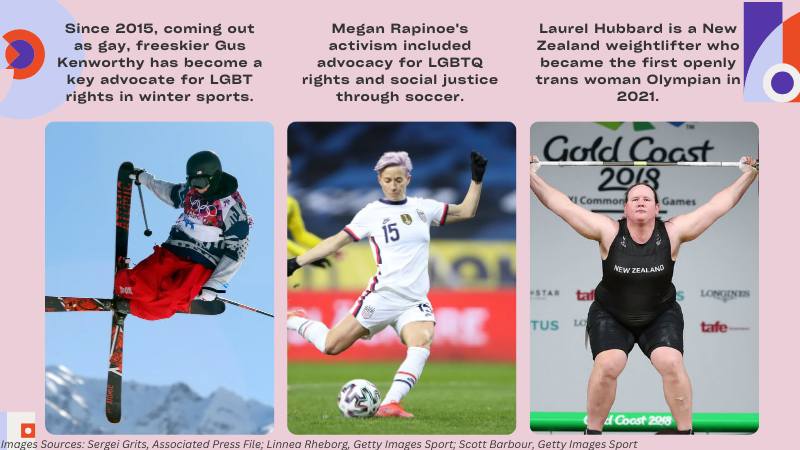
● Gus Kenworthy (2015)
Since 2015, coming out as gay, freeskier Gus Kenworthy has become a key advocate for LGBT rights in winter sports.
Coming out itself was applauded, and Kenworthy received tremendous love from the sporting fraternity and fans.
In the winter of 2014, Kenworthy became an icon of acceptance and awareness of gay rights.
He has voiced issues affecting LGBTQ athletes and even stood up to encourage equal rights for skiers.
Kenworthy sponsors local charity organizations keen on the welfare of the youth who are Lesbians, Gays, Transgenders, and Bisexuals.
He dared challenge the norm and fight for equal rights, and as such, he has become a role model to athletes worldwide.
● Megan Rapinoe (2012)
Megan Rapinoe’s activism included advocacy for LGBTQ rights and social justice through soccer.
Rapinoe came out as Gay in the year 2012, before the London Olympics, and became a strong advocate for lesbian-gay, bisexual, and transgender people in sports.
Her off-field work boosts her on-field play. Rapinoe is a proven professional footballer.
She has claimed many World Cups and Olympic medals for the U.S. women’s soccer team.
LGBTQ causes, and Rapinoe supports the wage inequality of female athletes alongside other social issues.
It has helped shed light on various social issues and oppressed groups, shattering prejudice.
● Laurel Hubbard (2021)
Laurel Hubbard is a New Zealand weightlifter who became the first openly trans woman Olympian in 2021.
Hubbard’s Tokyo Games participation gave attention to the Transgender issue and laid down a significant foundation for the Inclusion and Fairness policies.
Hubbard’s trip to the Olympics added support and criticism to identifying gender in sports.
Like any other participant, she proved that inclusion has progressed despite the barriers.
Transgender Olympics participation from Hubbard paved the way for inspiring several transgender athletes and underscored the importance of true bio-game venues.
Highlights of LGBTQ Representation in Past Olympic Games
We can also look at the previous Olympic games to view the key moments of LGBTQ representation and the advancements we have achieved. This includes:
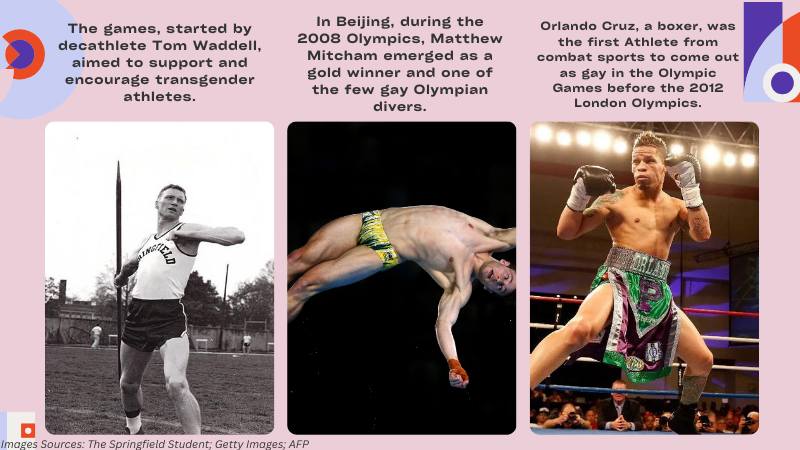
● Tom Waddell (1968)
The games, started by decathlete Tom Waddell, aimed to support and encourage transgender athletes.
He competed in the 1968 Olympics.
Waddell envisioned the Gay Games as a way to put the queer community in a positive light and display both athleticism and acceptance to let out/let free queer athletes on the playing field.
This sporting event started in 1982 and has now attracted thousands of participants for the Gay Games.
These Games have been a source of support and recognition for lesbians and gays/queers, a tribute to Waddell.
Those are the impacts of this man, who has encouraged many others to create awareness of including sports for all.
● Matt Mitcham (2008)
In Beijing, during the 2008 Olympics, Matthew Mitcham emerged as a gold winner and one of the few gay Olympian divers.
Mitcham, as the first gay Olympic gold medallist, is of historical dimension.
Mitcham demonstrated that LGBTQ athletes can also excel in the highest forms.
Through facing the facts about his sexual orientation and achievements, numerous gay athletes have been encouraged to chase their dreams with no regard for prejudice.
Mitcham has supported the rights and Equality of the lesbians, gays, bisexuals, transgender, queer, and intersex people.
● Orlando Cruz (2012)
Orlando Cruz, a boxer, was the first Athlete from combat sports to come out as gay in the Olympic Games before the 2012 London Olympics.
Cruz’s action was daring in a sport that quite several times has been associated with violence and prejudices, especially against gays.
His visibility has ensured that the identities of the rugby sports personnel and sporting personalities, in general, are dealt with in ways that are not only hurdle-free but also affirmative.
This motivates athletes to live as they want and pursue their dreams through Cruz’s support for the rights of the LGBTQ community.
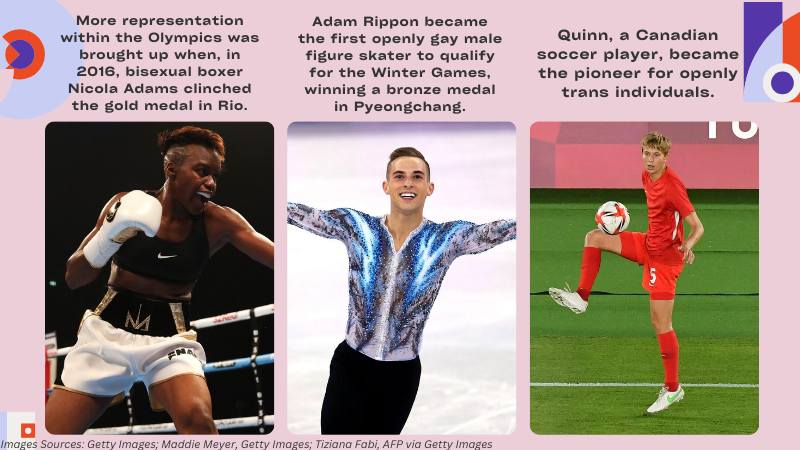
● Nicola Adams (2016)
More representation within the Olympics was brought up when, in 2016, bisexual boxer Nicola Adams clinched the gold medal in Rio.
What stands out is that Adams has not only been a fighting success but also outspoken about her sexual orientation, thus enlightening other gay combat athletes.
The aspects of her life, especially as a bisexual athlete, have contributed positively to promoting sports.
Adams’s struggle for lesbian, homosexual, bisexual, and transgender persons’ Equality, as well as women’s liberation, motivates all athletes to chase dreams as well as fair living opportunities.
● Adam Rippon (2018)
A proud moment in American Olympic history was in 2018.
Adam Rippon became the first openly gay male figure skater to qualify for the Winter Games, winning a bronze medal in Pyeongchang.
Rippon is a valuable figure in the gay community.
He represents them in ice skating and sports.
He is an activist for sexual minorities among youngsters and for giving a voice to the gay community, a sports players’ advocate.
● Quinn (2021)
Quinn, a Canadian soccer player, became the pioneer for openly trans individuals.
They were the first trans and non-binary Olympic champions at the 2021 Tokyo Olympics.
Quinn’s must-read success story raised awareness of trans and non-binary athletes in sports.
Quinn’s Olympics participation inspired many trans and non-binary athletes worldwide.
It showed the sport’s subtlety.
Their courage defies social prejudice, gaining them access to restricted fields.
Quinn supports civil liberties and opportunities for the LGBTQ+ community, except in sports.
LGBTQ and Crossdresser Representation at the 2024 Olympics
The inclusion of gay, lesbian, and cross-dressing athletes is a good sign.
It shows a move towards diversity in the 2024 Olympics.
Here are famous athletes and their sports.
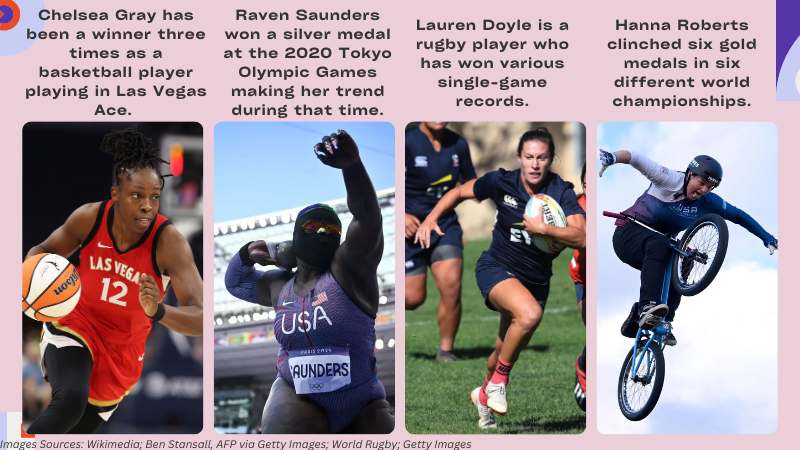
● Chelsea Gray (Basketball)
Chelsea Gray has been a winner three times as a basketball player playing in Las Vegas Ace.
She is one of the 2024 LGBTQ representations in the group of the USA women’s Olympic basketball.
This woman enjoys a cordial relationship with Tipesa Gray, who happens to be her husband.
In places where few black women dare to write or take center stage, her willingness to exhibit her talent is engaging the attention of people in our community.
● Raven Saunders (Track & Field)
Raven Saunders won a silver medal at the 2020 Tokyo Olympic Games making her trend during that time.
Lately, Saunders has been in the spotlight.
She would love to beat the record among other athletes in the-LGBTQ community in 2024.
Her persistence and work ethic have put her in the final standings.
She also earned champion status at the 2015 and 2014 Championships.
● Lauren Doyle (Rugby)
Lauren Doyle is a rugby player who has won various single-game records.
Also, while pursuing her career, she has had various positions, such as captain of the US Eagles sevens team at the 2022 Rugby World Cup Sevens.
She has empowered our community, enabling others with similar interests to follow in her footsteps.
Doyle’s targets include being the guide of the team to the first rugby sevens medal in the subsequent Olympics due in 2024.
● Hannah Roberts (BMX rider)
Hanna Roberts clinched six gold medals in six different world championships.
She had an excellent Olympic record, preferably for the Olympic games.
Handling bikes such as the BMX bike, she is said to have been specialized in riding them from the time she was nine years old.
She also bagged silver at the Tokyo Olympics that were held in the year 2020.
Her words of wisdom for young people within the LGBTQ+ population are to be genuine.
Policies and Support Systems for LGBTQ Athletes
These support systems and policies include:
● Inclusive Policies
Inclusive policies ensure fairness for all athletes.
They defend and advocate for those of us in sports despite our sexual orientation and gender identity.
But the fact remains that the sports policy organization has tightened regulations whose sole purpose is to shelter and assimilate our community.
These are good policies that assist athletes to compete without regard to their race.
● Anti-Discrimination Measures
Several federations’ non-discrimination clauses protect LGBTQ athletes for several reasons.
Some policies impose stiff penalties for discrimination.
They also require LGBTQ education and training for officials, coaches, and athletes.
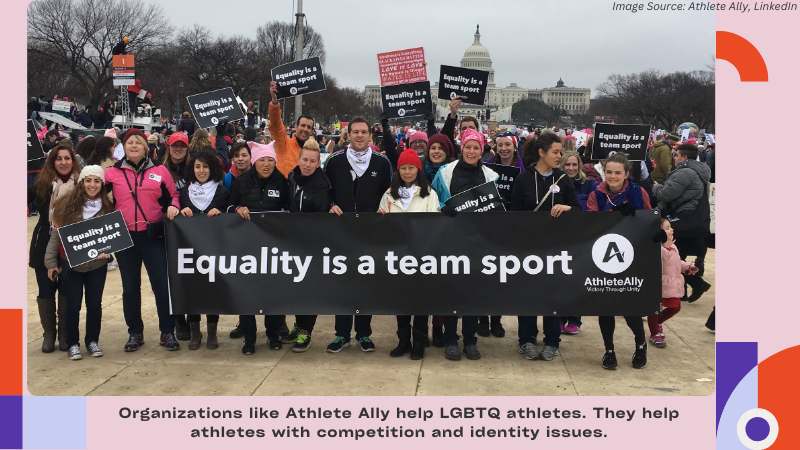
● Mental Health Support
Athletes’ mental health is critical to their performance.
Organizations like Athlete Ally help LGBTQ athletes. They help athletes with competition and identity issues.
This support helps them excel in sports and life.
● Educational Programs
In 2024, athletes, coaches, and officials attend programs on LGBTQ issues.
They want to create a progressive sports culture.
To do this, they will fight the project’s biased norms.

● Pride Houses
During the Olympics, LGBTQ athletes and fans can find support and info at Pride Houses.
They let LGBTQ+ people celebrate their unity and togetherness.
Challenges and Overcoming Barriers
In 2024, we can overcome many challenges, especially in the Olympics, such as:
● Discrimination and Bias
A large percentage of LGBTQ people go through prejudice, especially athletes.
In this respect, advocacy groups and inclusive policies are needed.
These groups work without relent to fight discrimination, spread the word, and champion change in sports.
● Lack of Representation
LGBTQ athletes may report less physical activity.
They feel marginalized by the sports community.
We can solve this by increasing an organization’s visibility.
Then, we can build networks to help eliminate this barrier.
Media and organizations can educate and fight for equality by acknowledging LGBTQ athletes.
They can inspire future generations.
● Safety Concerns
We may also face safety concerns that may hinder our participation as LGBTQ athletes.
This may occur in countries that have forbidden the LGBTQ community.
In such places and countries, strong security is essential for our safety.
This means safe housing, private transport, and LGBTQ-trained security.
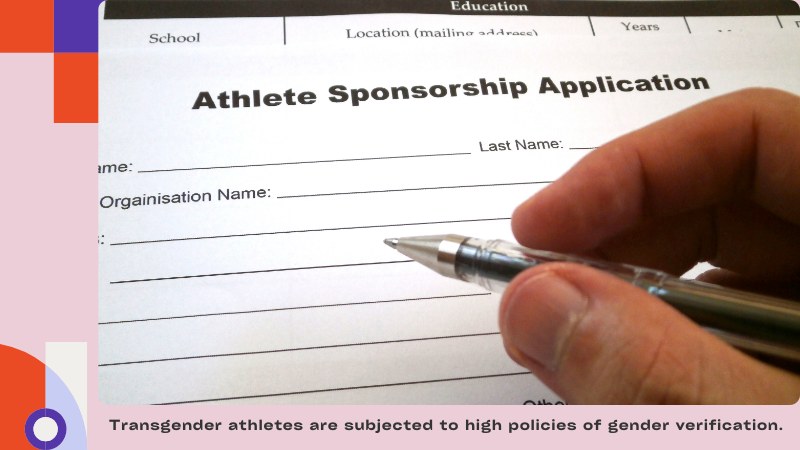
● Gender Verification Policies
Transgender athletes are subjected to high policies of gender verification.
We remain up for the cause of dignity and inclusion in policy.
It may be an attempt to create fewer, better bias rules.
They should respect athletes’ privacy and dignity while ensuring fairness in the sport.
Hopes and Expectations for Future Olympic Games
The LGBTQ community hopes for more from the future Olympics, such as:
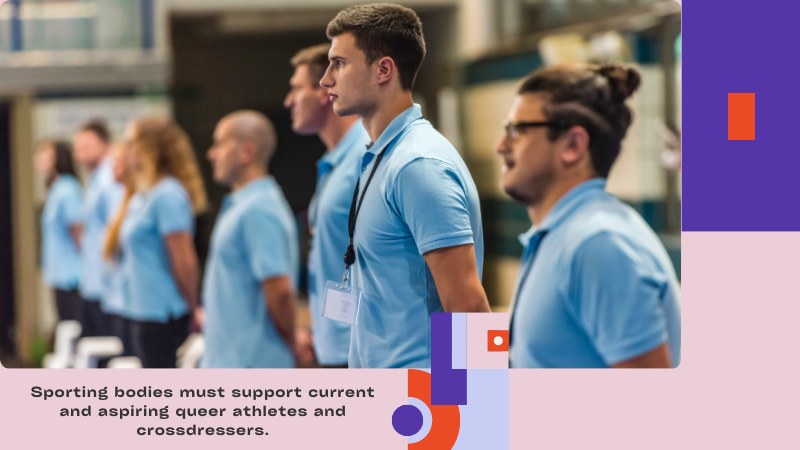
● Improved Support Systems
Sporting bodies must support current and aspiring queer athletes and crossdressers.
It covers counseling, shelters, and advocacy groups.
They provide emotional and psychological support to help athletes.
This must be done without bias or demoralizing them based on their gender.
● Equality in Competition
In the future, we want a fair society for all athletes, regardless of sex or sexual orientation.
They should have equal opportunities without discrimination.
Training fields, coaches, and other items required in the training process are available.
So, fairness and Equality in competitiveness are not fixed.
They require constant evaluation and updates to policies.
● Policy and Regulation Reforms
To foster LGBTQ athletes and crossdressers, we need consistent social policies and laws.
It involves changing the rules on gender verification and participation. We want to replace them with fair, non-segregated, and scientific.
● Celebration of Diversity
Expectations are clear: the future Olympics should embrace diversity.
This means respecting lesbian, gay, bisexual, and transgender athletes and crossdressers.
It calls for a mix of cultures in the opening and closing ceremonies of the Games to promote harmony.
Conclusion
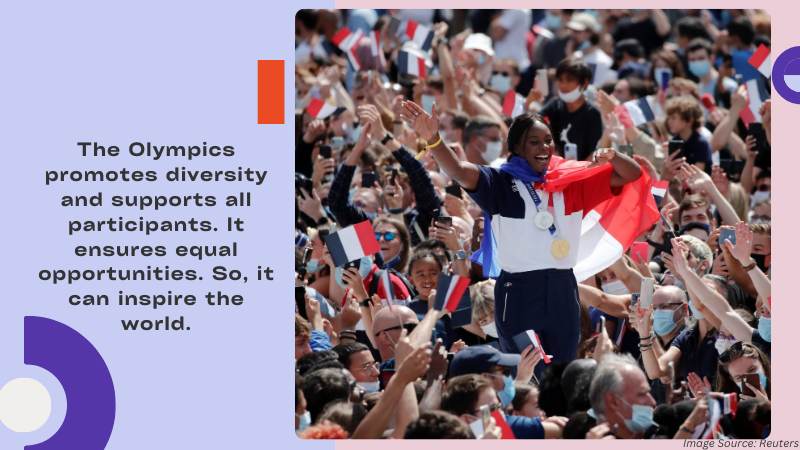
The Olympic Games need some changes to be better and more diverse.
They should be less restrictive. The Olympics promotes diversity and supports all participants.
It ensures equal opportunities. So it can inspire the world.
These goals are reasonable.
Since their aim is to create a friendly atmosphere at sports events and respect the Games’ spirit.
Modern development brightens our hope, but the journey is far from over.
Future Olympic Games can inspire hope and joy for all.
They should unite people of all genders and sexual orientations.
- Breaking Gender Norms: Why Gender Expression Is a Playground, Not a Cage
- Why 2025 Is the Best Time to Start Crossdressing and Express Your True Self
- The Truth About Crossdressing: History, Meaning, and Misunderstandings
- Joining TVChix: The Online Space That Changed My CD Experience
- Praise vs. Degradation: What Fuels Your Feminine Journey?
- How to Support and Navigate Life with a Crossdressing Husband
- Creating a Feminine Home: Decor Tips for Trans Women
- How to Celebrate Transgender Awareness Week & TDOR 2024?
- What is the Trans Bulge? Exploring Body Positivity and Identity
- What Are Pussy Panties: Ultimate Guide for Crossdressers and Transwomen
- How to Take Crossdresser Pics to Document Your Transformation
- Top 10 Transgender Online Resources and Community Centers in 2024
Established in 2009, We are a recognized manufacturer and seller of professional crossdressing products.
It is our aim to become not just the most creative manufacturer but also a very considerate seller, as we provide the best quality products for crossdressers all around the world.
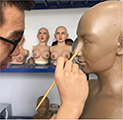
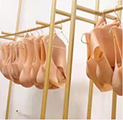








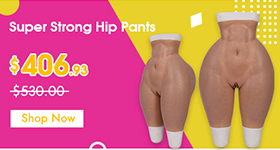









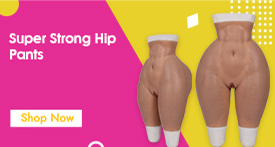


 Breast Forms
Breast Forms  Body Suit
Body Suit  Realistic Mask
Realistic Mask  Femini Girdle
Femini Girdle Hip & Butt Enhancement (8)
Hip & Butt Enhancement (8) Penis Prosthesis
Penis Prosthesis Fake Muscle
Fake Muscle Bikini
Bikini  Wig
Wig  Corsets
Corsets Course
Course service@roanyer.com
service@roanyer.com +8618652200711
+8618652200711 Facebook
Facebook YouTube
YouTube Twitter
Twitter Instagram
Instagram




